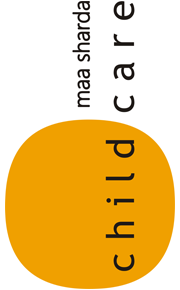 90996 08880, 90997 08880
90996 08880, 90997 08880 +91- 72 1110 3330
+91- 72 1110 3330 Make An Appointment
Make An Appointment maashardachildcare@gmail.com
maashardachildcare@gmail.com
The color, symbolizes the sun, the eternal source of energy. It spreads warmth, optimism, enlightenment. It is the liturgical color of deity Saraswati - the goddess of knowledge.
The shape, neither a perfect circle nor a perfect square, gives freedom from any fixed pattern of thoughts just like the mind and creativity of a child. It reflects eternal whole, infinity, unity, integrity & harmony.
The ' child' within, reflects our child centric philosophy; the universal expression to evolve and expand but keeping a child’s interests and wellbeing at the central place.
The name, "Maa Sharda;" is a mother with divinity, simplicity, purity, enlightenment and healing touch, accommodating all her children indifferently. This venture itself is an offering to her........
musical keys emotionsmusical keys emotions
There are many theories about why people can feel emotions by different modes, such as a theory related to the dissonance of keys in different kinds of modes, the uncertainty in the tonic of different scales, and so on (Richard Parncutt, 2014). Provide people with an enriching musical experiences to help them to motivate themselves. The enjoyment of music appears to involve the same pleasure center in the brain as other forms of pleasure, such as food, sex, and drugs . Scholars have dedicated their entire lives to studying how the aesthetic, psychological, and scientific forces surrounding a performance can cause us to feel so deeply. The "Star-Spangled Banner" stirs pride. Musical key characteristics are something that are never talked about for some odd reason. Holly Fletcher. 24. One is the cognitivist view which supports music as appearing to evoke emotions, the brain acknowledges the emotions in the music, but the listener does not experience any actual emotions (Thompson,2009). I think the key is more like a starting point, a foundation on which to build, than a determinative e. The link between music and emotions is more of an issue than ever before, and music research is increasingly focusing on understanding the complex characteristics of this interaction. Beethoven's 5th Symphony. I could prep the manuscript paper before I started. The minor scale is the pattern in western music typically associated with sad feelings. This key-emotion theory was standard before the 20th century. Coffee Coffee. This Baroque practice of relating music with various emotions dates back to ancient Greece and the teachings of the temperaments. Resentment and discontent are its language. How to project emotions through music: modulation 16 Examples Of Classical Music To Teach Emotion (With Activities) Music Keys & Emotion - Inspired Cooking - WordPress.com Below are the emotions and topics that match each music key. It's more common than not that the composer turns around all expectations that have to do with the key in question. More information.. More like this. Dec 29, 2017. This idea corresponds to the doctrine of ethos (originated in ancient Greece), a belief that the foundation of music, pitches and rhythms, possess qualities that affect moral character and the behavior of people. Certainly, most music conveys emotion. Music to put you in a better mood - YouTube BPM. Thanks to the ability of music to act at all levels, music therapy can achieve some objectives such as: Improve the level of emotions and behavior. KEY CONCEPT 3. Answer (1 of 6): I think in all styles of music it is the relationship between chords as they change that creates the tension that brings out emotion of any kind. $6.16: . Answer (1 of 5): Writing about this feels like a false generalization at best. Emotions of the Musical Keys. Musical pleasure. Published on December 29, 2017 by Inspired. Musical Theatre. List of Music Keys - Music Theory Workshop From the GGSC to your bookshelf: 30 science-backed tools for well-being. More information.. More like this. If you play those chords, you'll have a happy sounding song. Fast music usually sounds happy, while slower tempos tend to sound sad or melancholy. The other is the emotivist view which supports the idea . The 8 Components of Musical Emotion | Psychology Today Relaxing/Calm. The ancient Greeks used a few more musical scales to denote certain moods (I'm missing my Greek history and theatre books at the moment).

